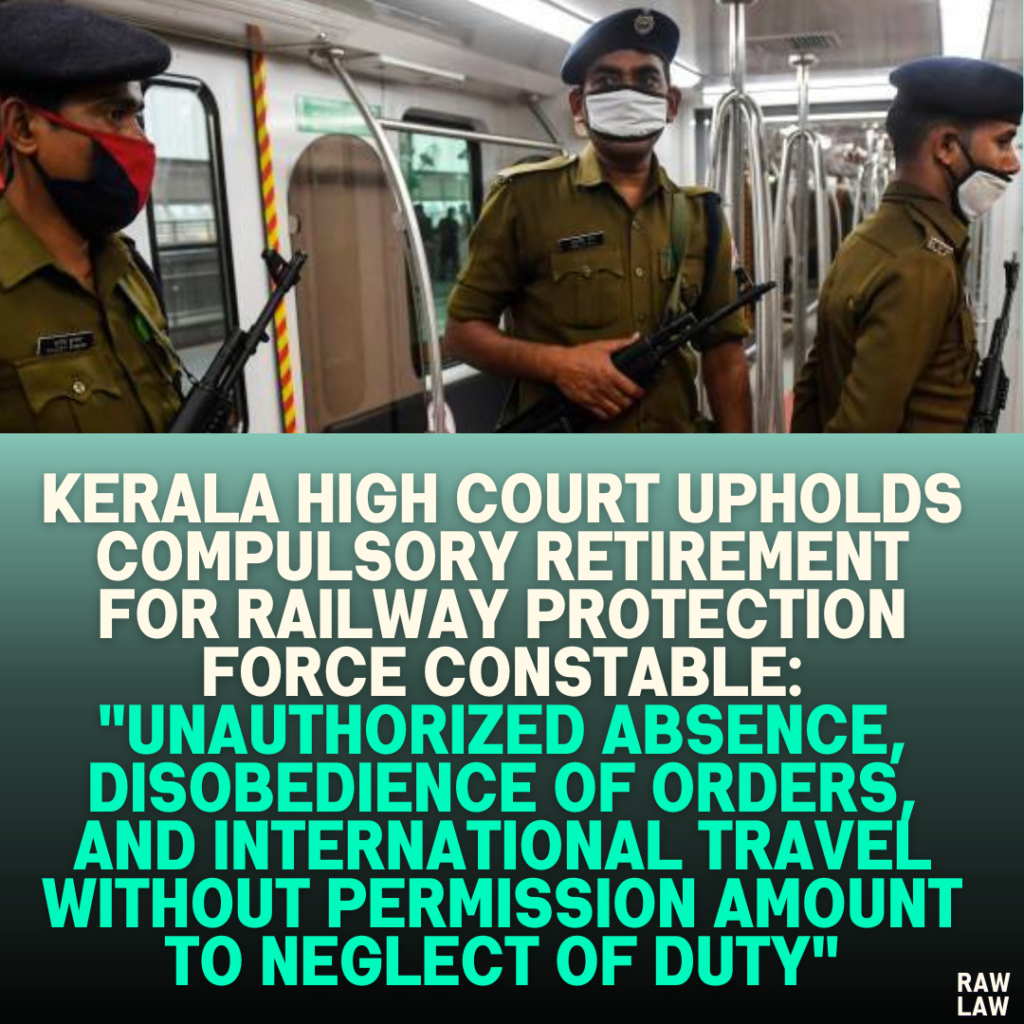Court’s Decision
The Kerala High Court upheld the appellate authority’s decision to impose the penalty of compulsory retirement on the petitioner, a Railway Protection Force (RPF) constable. The court dismissed her writ petition, affirming that her actions—unauthorized absence from duty and refusal to avail treatment at Railway facilities—constituted misconduct under the Railway Protection Force Rules, 1987.
Facts
- Petitioner’s Medical Treatment: The petitioner underwent knee surgery at the Medical College Hospital, Thiruvananthapuram, in September 2015. Following her surgery, she continued treatment at the same hospital instead of the Railway Hospital, citing dissatisfaction with the latter’s facilities.
- Absence from Duty: Starting December 2, 2015, the petitioner was absent from duty. Despite several directives to report to the Railway Hospital in Madurai for further treatment, she failed to comply.
- Family Constraints: The petitioner claimed she could not stay at the Madurai hospital due to personal reasons, including her children’s care needs.
- Disciplinary Proceedings: The petitioner’s absence led to disciplinary proceedings. The disciplinary authority initially ordered her removal from service. This was modified by the appellate authority to compulsory retirement, which was challenged in the writ petition.
Issues
- Unauthorized Absence: Did the petitioner’s absence amount to unauthorized absence and neglect of duty under the applicable rules?
- Validity of Medical Certificates: Was the petitioner’s reliance on certificates from non-Railway medical practitioners valid under the Indian Railway Establishment Code (IREC)?
- Proportionality of Penalty: Was the punishment of compulsory retirement excessive or disproportionate to the alleged misconduct?
Petitioner’s Arguments
- Medical Grounds: The petitioner argued that her absence was not unauthorized since it was medically justified and supported by certificates from a government hospital.
- Rule Interpretation: She claimed Rule 521 of the IREC allowed her to seek treatment and provide certificates from private practitioners, which should have been accepted.
- Supreme Court Precedent: The petitioner cited Krushnakant B. Parmar v. Union of India, arguing that mere unauthorized absence does not constitute misconduct unless there is evidence of wilful intent.
Respondent’s Arguments
- Rule Compliance: The respondents argued that the petitioner violated Rule 603 of the IREC, which mandates treatment at Railway hospitals unless such facilities are unavailable.
- Unauthorized Activities: They presented evidence that during her absence, the petitioner engaged in unauthorized activities, including an international trip without prior permission.
- Impact on Discipline: The respondents contended that her actions reflected wilful disobedience and negatively impacted the RPF’s discipline and reputation.
Analysis of the Law
- Rule 603 of IREC: Railway employees must use Railway medical facilities unless unavailable. The petitioner’s dissatisfaction with Railway facilities did not exempt her from this rule.
- RPF Rules: Rule 146 identifies unauthorized absence and disobedience of orders as misconduct. Rule 272 requires members on the sick list to remain in the place of treatment unless authorized otherwise.
- Judicial Precedents:
- Krushnakant B. Parmar: This case established that absence is not misconduct unless wilful. The court distinguished this case, noting that the petitioner provided no valid justification and wilfully disobeyed orders.
- Union of India v. P. Gunasekaran: This case limited judicial review in disciplinary matters, emphasizing that courts should not re-evaluate evidence or substitute their judgment unless the punishment is shocking.
Precedent Analysis
The court relied on Union of India v. P. Gunasekaran to underscore the principle that judicial review in disciplinary cases should respect the findings of departmental authorities unless there is a clear procedural lapse or disproportionality in punishment.
Court’s Reasoning
- Evidence of Misconduct: The court found that the petitioner failed to provide sufficient justification for her absence and refused to follow medical directives, violating the RPF’s code of conduct.
- Adverse Inference: Her refusal to undergo treatment at Railway facilities and her international trip during the absence were deemed indicative of wilful misconduct.
- Disciplinary Authority’s Findings: The court affirmed the findings of the disciplinary authority, noting they were based on clear evidence.
- Proportionality of Punishment: The court held that the penalty of compulsory retirement was appropriate and not disproportionate, given the petitioner’s actions.
Conclusion
The Kerala High Court dismissed the petitioner’s writ petition, holding that her actions constituted unauthorized absence, disobedience of orders, and neglect of duty under the RPF Rules. It ruled that the penalty of compulsory retirement was justified and consistent with service regulations.
Implications
- Service Discipline: The judgment reinforces the importance of discipline and compliance in public service, especially in uniformed forces like the RPF.
- Judicial Review: It underscores the limited scope of judicial intervention in disciplinary matters, respecting departmental findings unless there is procedural irregularity or shocking disproportionality in punishment.
- Employee Obligations: The decision clarifies that dissatisfaction with employer-provided facilities does not excuse employees from adhering to service rules.




Pingback: Delhi High Court: “Child Cannot Be Moved Out of Jurisdiction Without Court’s Permission” — Upholds Father’s Rights in Habeas Corpus Case for Child Illegally Taken to USA, Violating Parens Patriae Jurisdiction and Court Orders - Raw Law